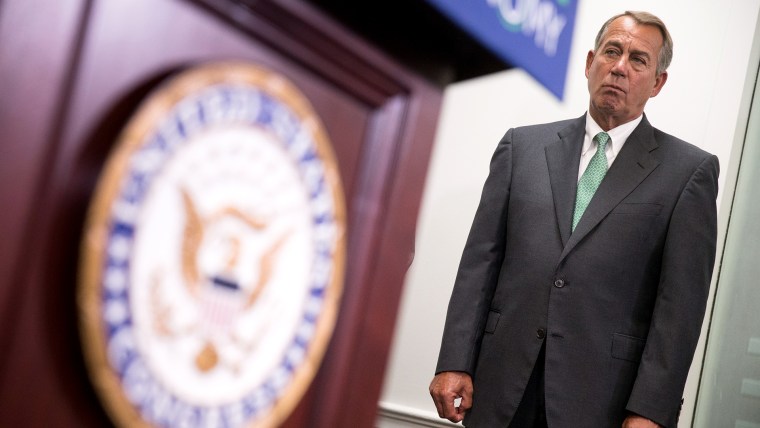House Speaker John Boehner's (R-Ohio) last day on Capitol Hill is supposed to be two weeks from today, though what's supposed to happen and what actually will happen may not be the same thing.
The obvious dilemma that may delay the Republican leader's departure is the fact that there's no one in place to succeed him. House Majority Leader Kevin McCarthy's (R-Calif.) promotion didn't work out well, and House Ways & Means Committee Chairman Paul Ryan (R-Wis.) says he doesn't want the job.
The less obvious problem is what happens if House GOP members continue to struggle to find Boehner's replacement.
Treasury Secretary Jacob Lew informed Congress recently that a debt-ceiling increase will be necessary by Nov. 5. Yesterday, Lew recalculated the numbers and moved up the deadline -- to Nov. 3. That's just 18 days from now, during which time Congress will only be in session for 10 days.
The good news, for those hoping to see the United States avoid an unnecessary catastrophe, is that Boehner is moving forward with a plan to pass a debt-ceiling increase ahead of the deadline. Since Senate Majority Leader Mitch McConnell (R-Ky.) has already vowed not to push the nation into default, congressional Republicans may yet avoid hurting Americans on purpose.
But The Hill flagged a possible wrinkle.
When he announced his resignation, Boehner said he was ready to clean up some outstanding issues for his successor -- which Washington took as a signal on the debt limit. But Boehner could face a move from conservatives to remove him as Speaker immediately if he brings a clean bill to raise the debt ceiling to the floor.
Note, The Hill didn't quote any members -- on the record or off -- threatening to pursue such a course, but the speculation didn't just come out of thin air.
In fact, just last week, Rep. Mick Mulvaney (R-S.C.), a founding member of the House Freedom Caucus, was asked whether the right-wing caucus had confidence in Boehner when it came to handling the debt ceiling. Mulvaney replied, simply, "No."
The assumption among many has been that if Republicans can't coalesce around a new Speaker, than Boehner would stick around until GOP lawmakers figured out what to do. But let's not forget the circumstances that precipitated Boehner's resignation in the first place: he faced the very real possibility of the House Freedom Caucus forcing him out.
If Boehner intends to stick around until his party figures out how to replace him, the same rebellious faction will not suddenly start liking him more. On the contrary, they may begin anew with their plan to "vacate the chair" (the term for voting to oust the Speaker).
Boehner wants to retire anyway, but on his own terms. With a debt-ceiling vote coming up, the choice may not be entirely his to make.
Just so we're clear, the debt-limit increase isn't optional. It's something that must happen. The questions now are how long Republicans will play games before doing what must be done, and whether the responsible course will cost Boehner his job sooner than he intended.
